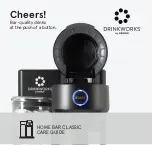
Page 8 of 16
507388-01
Issue 1732
Supply and Return Duct(s)
Provide duct(s) sized sufficiently to handle the larger of the
air volumes for heating or cooling provided by this model.
Connect the supply duct to the top of the unit using canvas
connections or other flexible connections to prevent noise
transmission into the duct system.
To connect the return duct to the system, use a straight
piece of duct 22” wide by 6” deep. Insert the duct into the
return opening in the bottom of the unit and flange the
duct over the existing flanges around the opening inside
the unit. Make sure that all sides of the duct are flanged
over to permit removal of the cooling chassis if required.
Use a flexible connection to attach the remainder of the
return duct. The return duct should be sealed to the unit
casing and must terminate outside the space containing
the furnace.
Adjustments – Heating Section
Temperature Rise
At time of installation, the temperature rise must be
adjusted to be within the range specified on the unit rating
plate. See Table 2. Select a lower blower speed to increase
rise. Select a higher blower speed to reduce rise.
Pressure Regulator
The gas input must not exceed the figures shown on the
rating plate. The unit is equipped for rated inputs with
manifold pressures of: 3.5” W.C. for natural gas and 10.5”
W.C. for propane.
The manifold pressure can be measured by removing the
pipe plug in the automatic gas valve. Connect a water
manometer and measure the pressure. See Figure 9.
Only small variations in gas input may be made by adjusting
the regulator.
In no case should the final manifold
pressure vary more than 0.3” W.C. for natural gas or
0.7” W.C. for propane.
To adjust the regulator, turn the adjusting screw on the
regulator clockwise to increase pressure and input or
counterclockwise to decrease pressure and input. See
For natural gas installations, check the burner rate by
observing the gas meter (making sure that all other gas
appliances are turned off). The test hand on the meter
should be timed for at least one revolution. Note the
number of seconds for one revolution.
BTU/HR
Input
=
Cubic Feet per
Revolution
x 3600 x Heating
Value
# Seconds per
Revolution
Adjustments – Cooling Section (HWC models)
No adjustments are required or should be attempted
regarding any of the components of the cooling chassis.
The chassis should be checked to see that none of the
wiring is loose or missing.
Cooling chassis is charged with R410A refrigerant.
Blower
The unit contains a direct-drive, multispeed blower. The
proper speeds have been preset at the factory for heating
and cooling. Refer to the wiring diagram or Table 2 for
recommended heating/cooling speeds for specific models.
Direct-drive blower motors are permanently lubricated and
do not require oiling.
Limit Control
A fixed temperature limit control is provided which will shut
off the gas to the main burners if the unit is overheated for
any reason. The control must not be adjusted or relocated.
High Altitude Adjustments (U.S. Installations)
Ratings shown on the rating plate are for elevations up to
2000 feet. For elevations above 2000 feet, ratings should
be reduced at a rate of 4% for each 1000’ above sea level.
Refer to the National Fuel Gas Code Z223.1 (latest edition)
for further explanation.
Installation and Operation in Extremely Cold
Weather Areas
In areas where extremely cold (below – 20°F) outdoor
temperatures can be expected, some additional installation
and operating precautions should be taken. The following
precautions are taken to prevent possible vent system
ice blockage that could result in safety shutdown of the
burners:
1. Adjust to the highest achievable temperature rise
within the rise and static pressure ranges specified
on the rating plate. Depending on specific model, it
may be possible to change to a lower heating blower
speed tap to get a higher temperature rise. This also
increases comfort.
2.
Make sure there are no leaks of outside air into the
return air system.
3. Keep the outside louver grille as free as possible of
any ice that may form and obstruct the flue outlet.

































